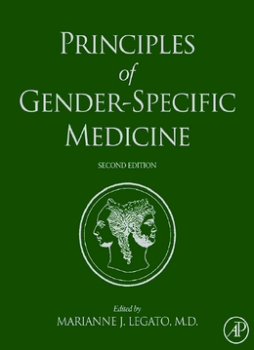
Additional Information
Book Details
Abstract
The field of gender-specific medicine examines how normal human biology and physiology differ between men and women and how the diagnosis and treatment of disease differs as a function of gender. This revealing research covers various conditions that predominantly occur in men as well conditions that predominantly occur in women. Among the areas of greatest difference are cardiovascular disease, mood disorders, the immune system, lung cancer as a consequence of smoking, osteoporosis, diabetes, obesity, and infectious diseases.
The Second Edition of Principles of Gender-Specific Medicine focuses on the essentials of gender-specific medicine and the current study of sex and gender differences in human physiology and pathophysiology. New section editors, new chapter authors, and new chapters have been added to reflect the most up-to-date clinical research and practice.
- Offers insight into how the gender-specific risks of one organ system’s disease affects the health of other organ systems
- Outlines the sex-specific differences of normal anatomy and physiology
- Illustrates the gender-specific features and quantifies "gender" and "sex" as risk factors across all major diseases
- Qualifies and analyzes the results of new drug therapies designed with gender-specific differences in mind: ex, hormone therapy in men and women for the prevention and treatment of cardiovascular disease
- All chapters progress translationally from the basic science to the clinical applications of gender-specific therapies, drugs, or treatments
- Sections on drug metabolism, aging, and meta-analysis of data incorporated into all disease-specific chapters
Reviews of the First Edition:
"The book will benefit primary care practitioners and physicians who manage chronic conditions. By bringing the information together, Legato sets the stage for the future of an exciting and rich new field...Some chapters can serve as independent monographs, and all seem to use current references and reflect a good review of the pertinent literature. Some chapters recommend sources for additional reading. In addition, authors identify gaps in the literature and offer recommendations for further investigation. These recommendations are among the best features of the textbook...We commend the editor, section editors, and chapter authors of this wonderful textbook. Principles of Gender-Specific Medicine has the potential to change the minds of those who have struggled to understand what "gender-based medicine" really means. The bottom line is that this effort has created a broad range of research opportunities and, consequently, the chance to improve treatment and disease outcomes for all: women, men, the poor, the rich, minorities and non-minorities, and, most important, children--the next generation of men and women."
--Journal of the American Medical Association, 2004;292:2921-2922
"A new field of investigation, education, and clinical practice is to be recognized by all who practice medicine...The information in this textbook can only be found in piecemeal if at all in standard medical textbooks, and we are pleased to know that there is now a text that brings this information together."
--Clinical Applications of Thrombosis/Hemostasis 11(4):500, 2005
